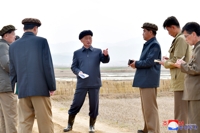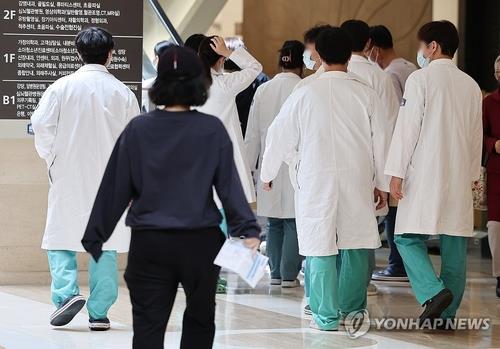(LEAD) S. Korea to develop ultra small-sized satellites to better monitor N. Korea
(ATTN: CHANGES photos)
By Choi Soo-hyang
TAEAN, South Korea, Aug. 5 (Yonhap) -- South Korea is working on a plan to develop ultra small-sized satellites to better monitor North Korea, a state-run defense research agency has said.
The small-sized satellites with Synthetic Aperture Radar (SAR) technology are expected to allow South Korea to monitor North Korea's military activities in near real-time, according to the Agency for Defense Development (ADD).
When using 32 units of such satellites at once, the military will be able to monitor the North every 30 minutes day or night, regardless of the weather.
The research, launched in December, is now in a preliminary design phase and is expected to be completed in 2023.
Technologies secured from the research will be able to be applied to other projects, officials said.
The development project was one of a series of research projects currently under way that the agency unveiled to media at its defense systems test center in Taean, 150 kilometers southwest of Seoul, on Monday ahead of its 50th founding anniversary.
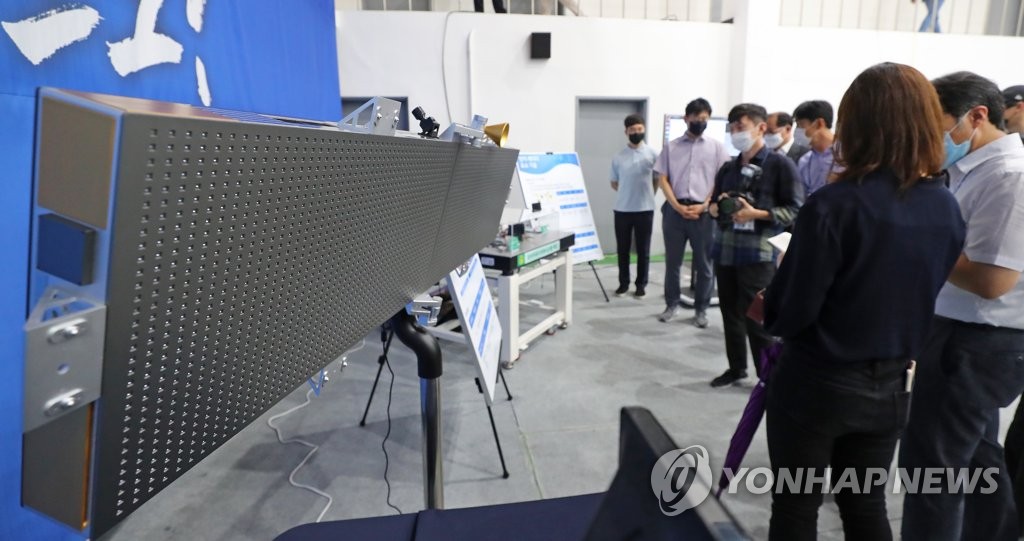
This photo, taken on Aug. 5, 2020, shows a model of an ultra small-sized satellite South Korea is developing to better monitor North Korea's military activities on display at the state-run Agency for Defense Development's defense systems test center in the western coastal city of Taean. (Yonhap)
Other key research initiatives include those on unmanned submarines, technology for stealth unmanned aerial vehicles and cures for COVID-19.
Last month, President Moon Jae-in visited the agency headquarters in Daejeon, 160 km south of the capital, and expressed gratitude for its contribution to research on the new coronavirus based on its research experience in the biochemistry field.
Many steps lie ahead for the research to be complete, but officials said it will help South Korea better respond to similar virus crises in the future.
With the unmanned submarines, the military will be able to collect information near the inter-Korean maritime border without dispatching sailors to the high-risk area, according to the agency.
The ADD is also home to the development of the Hyunmoo series of ballistic and cruise missiles, the Haeseong anti-ship missile, the Cheongung surface-to-air missile, the K9 self-propelled howitzer, the K2 main battle tank and other well-known weapons, some of which are exported.
"For the next 50 years, we will focus on developing covert weapons systems and daringly give a challenge to advanced scientific technologies such as artificial intelligence, quantum radar, synthetic biology and space science," agency chief Nam Sae-kyu said.
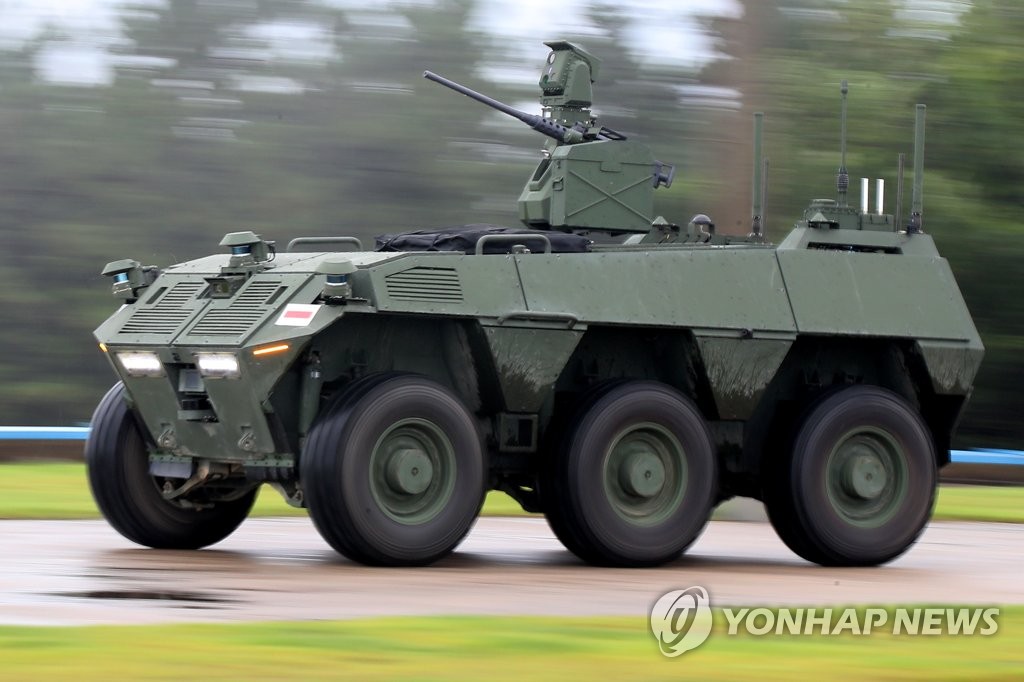
This photo, taken on Aug. 5, 2020, shows an unmanned surveillance vehicle in a trial performance at the state-run Agency for Defense Development's defense systems test center in the western coastal city of Taean. (Yonhap)
scaaet@yna.co.kr
(END)
-
 Defense chief says N. Korea's hypersonic missile 'unsuccessful' in last-stage glide flight
Defense chief says N. Korea's hypersonic missile 'unsuccessful' in last-stage glide flight -
 Overdue debut of Korean abstract art pioneer Yoo Young-kuk at Venice Biennale
Overdue debut of Korean abstract art pioneer Yoo Young-kuk at Venice Biennale -
 Relax, immerse yourself in scents at Venice Biennale's Korean Pavilion
Relax, immerse yourself in scents at Venice Biennale's Korean Pavilion -
 N. Korea has capability to genetically engineer biological military products: U.S. report
N. Korea has capability to genetically engineer biological military products: U.S. report -
 S. Korea marks 30th anniv. of Korean Pavilion at Venice Biennale with contemporary art
S. Korea marks 30th anniv. of Korean Pavilion at Venice Biennale with contemporary art
-
 Overdue debut of Korean abstract art pioneer Yoo Young-kuk at Venice Biennale
Overdue debut of Korean abstract art pioneer Yoo Young-kuk at Venice Biennale -
 Relax, immerse yourself in scents at Venice Biennale's Korean Pavilion
Relax, immerse yourself in scents at Venice Biennale's Korean Pavilion -
 Defense chief says N. Korea's hypersonic missile 'unsuccessful' in last-stage glide flight
Defense chief says N. Korea's hypersonic missile 'unsuccessful' in last-stage glide flight -
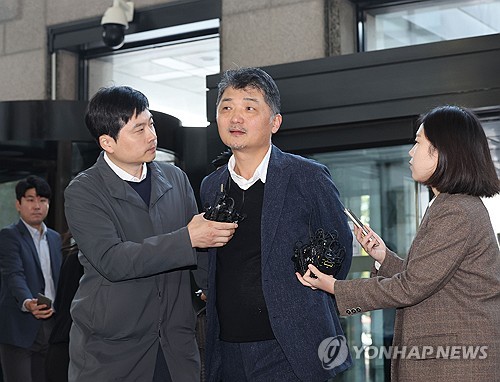 Questioning necessary for Kakao founder for suspected stock rigging: prosecution
Questioning necessary for Kakao founder for suspected stock rigging: prosecution -
 S. Korea marks 30th anniv. of Korean Pavilion at Venice Biennale with contemporary art
S. Korea marks 30th anniv. of Korean Pavilion at Venice Biennale with contemporary art
-
 Facebook page unveils photos of BTS member V in counter-terrorism unit gear
Facebook page unveils photos of BTS member V in counter-terrorism unit gear -
 Gov't likely to accept university chiefs' request to lower med school enrollment quota
Gov't likely to accept university chiefs' request to lower med school enrollment quota -
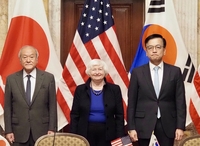 (4th LD) Finance chiefs of S. Korea, U.S., Japan recognize 'serious' concerns over 'sharp' won, yen depreciation
(4th LD) Finance chiefs of S. Korea, U.S., Japan recognize 'serious' concerns over 'sharp' won, yen depreciation -
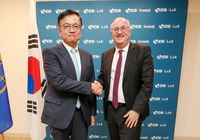 S. Korea to provide US$200 million in humanitarian aid to Ukraine this year
S. Korea to provide US$200 million in humanitarian aid to Ukraine this year -
 Russia's denial of entry of S. Korean national unrelated to bilateral ties: Seoul official
Russia's denial of entry of S. Korean national unrelated to bilateral ties: Seoul official















